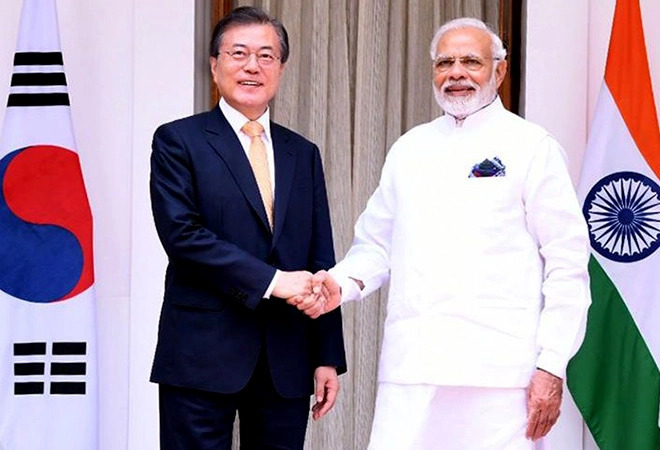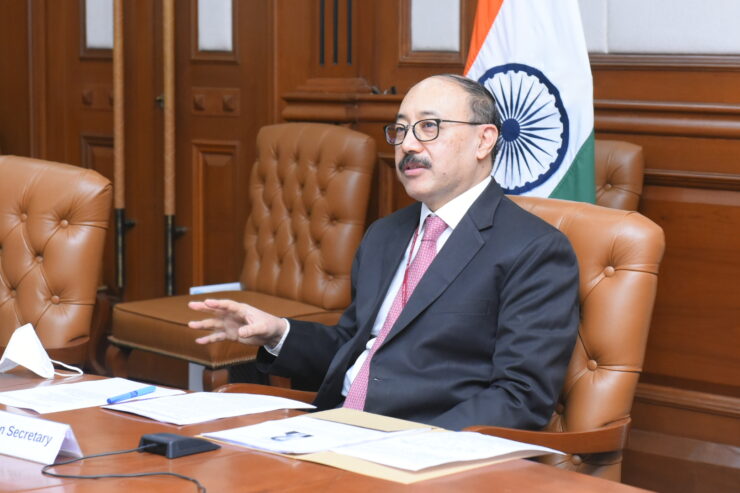
While speaking at a programme organised by the Delhi-based think tank Ananta Centre and Embassy of Japan on February 24, Foreign Secretary Harsh Vardhan Shringla said the pandemic has generated severe economic stresses and fundamentally altered geopolitical and geo-economic equations, hence India and Japan should enhance defence and strategic ties, especially on defence equipment and technology.
Since 2014, India and Japan, as special strategic and global partners, have infused dynamism to their defence ties with both sides setting up Joint Working Group on Defence Equipment and Technology Cooperation to identify the areas they will work together. Both countries are regularly holding two-plus-two minister-level talks since 2019. In September 2020, both sides inked the landmark, acquisition and cross-servicing pact, which will allow the militaries of the two countries to exchange supplies and services on a reciprocal basis.
With this, Japan has become the sixth country after the US, France, Singapore, South Korea and Australia with which India has such an arrangement. The logistic pact will also enhance the interoperability between armed forces of the two countries and in their engagements in the United Nations peacekeeping operations, humanitarian international relief and other mutually-agreed activities.
However, in view of the emergence of fresh geopolitical tension in the horizon with Russia’s attack on Ukraine uniting liberal and democratic forces against imperialism and expansionism, Japan will like to enhance its security bandwidth with India to checkmate China, which will in all likelihood create tension in the Taiwan Straits and the South China Sea. Japanese Prime Minister Fumio Kishida, as per Nikkei Asia, Japan’s leading financial newspaper, who is likely to visit India this month, will lay focus on bolstering ties among countries in the Indo-Pacific security grouping known as the Quad.
Japanese Prime Minister Fumio Kishida who is likely to visit India this month will lay focus on bolstering ties among countries in the Indo-Pacific security grouping known as the Quad
Japan will host the leadership summit of the Quad in May, and as such the Japanese Prime Minister’s visit to India for the annual summit with his counterpart Narendra Modi assumes high significance. Japan and India are, in particular, apprehensive of the designs of China in the Indo-Pacific region, where there is a possibility that the challenges faced by the smaller and weaker nations in protecting their sovereignty and integrity will increase. It is felt that Russia’s aggression against Ukraine and the reluctance of the US and western countries to come to the rescue of the East European country, has emboldened China to replay the same militaristic adventure in its neighbourhood, including Taiwan.
Given this, Japan wants India, a nuclear power after the US in the four-member Quad, to give China a run for its money. Tokyo is aware of India’s defence capability; it knows India’s history of developing and manufacturing its own military hardware. India had developed its own fighter jet in the 1960s; deployed indigenously developed tanks since the 1970s; carried out successful nuclear bomb test in 1974; commissioned first indigenous frigates in 1983; developed ballistic missiles in the 1990s; ready to commission indigenously developed aircraft carrier INA Vikrant in 2022; indigenously developed fighter aircraft Tejas is already part of armed forces and so is internally manufactured Dhruv helicopter.

Experts say that it will be in the larger interest of Japan if it joins India in the co-production of innovative defence technology. Already, the process for this has begun. This apart, together with Australia, Japan wants a pact with India to bolster defence and security cooperation, all this to push back any Chinese adventurism in the Indo-Pacific region. Obviously, the pact, Reciprocal Access Agreement, which is still to be signed by the three countries, is aimed at countering the security challenges faced by them in the region. Experts suggest that in the changed situation, when the world seems to be vertically split in two camps, one led by the US and liberal, democratic countries and the other by the Russia-China axis, Japan and India could emerge as a power of reckoning in the Indo-Pacific.
India and South Korea conduct naval exercises on a regular basis; military delegations regularly undertake bilateral visits to training establishments in both countries; hold two plus-two-dialogue annually since 2019. Spurred by the convergence of strategic interests and reinforced by mutual trust and goodwill, the defence relations of India and South Korea have moved from strength to strength in the past few years. The two countries have agreed to go for the joint production and export of military hardware, scale-up intelligence sharing and boost cooperation in cyber and space areas as part of an overall expansion of defence and security ties.
The two countries also hold Strategic Dialogue at the NSA level on a regular basis. Last year in December, they, under the rubric of the close and strategic partnership, held in-depth discussions to further enhance their strategic ties.
During the third India-Republic of Korea Strategic Dialogue between the National Security Council Secretariats of the two countries on December 3, 2021, both sides agreed to further strengthen and deepen mutually beneficial strategic cooperation in areas of bilateral, regional and global interests. Indigenisation, joint development and joint production in the defence sector between India and South Korea was emphasized. Partnership in critical and high technologies and supply chain resilience were also discussed.
In sync with their desire to work closely in the areas of common interests, they work compactly in the field of Cyber Security, Information Technology, Maritime Security and threats and challenges from terrorism, extremism and radicalisation. India’s Act East Policy and South Korea’s New Southern Policy are helping in enhancing synergies between the two countries on defence and strategy fronts and this can be seen in their desire to invest in their efforts to strengthen cooperation in the Indo-Pacific region. Yet, India and South Korea’s defence relations have not matured as much as India’s ties with Japan.
-The author is senior journalist and commentator on foreign affairs. The views expressed are personal and do not necessarily carry the views of Raksha Anirveda








